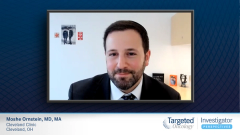
Future Direction for Patients With mRCC
Discussing future needs and investigating novel therapies for newly diagnosed metastatic renal cell carcinoma.
Episodes in this series

Transcript:
Moshe Ornstein, MD, MA: Although a lot of progress has been made with IO [immuno-oncology] doublet therapies, whether it’s using IO in combination with another immunotherapy or IO in combination with a TKI [tyrosine kinase inhibitor] agent, there are some ongoing phase 3 trials which may potentially change the standard of care down the road. One trial that is likely to read out in 2022 is the COSMIC-313 trial. A bit of background for this trial is that the addition of IO to TKI improves outcomes compared to TKI monotherapy. In other words, we’ve seen that 2 agents are better than 1. The COSMIC-313 trial is asking, are 3 better than 2? It randomizes patients with treatment-naïve metastatic RCC [renal cell carcinoma] to receive ipilimumab [Yervoy] and nivolumab [Opdivo], so an IO/IO combination versus ipilimumab plus nivolumab plus cabozantinib [Cabometyx]. Previously we discussed comparing and deciding between IO/IO versus IO/TKI. This trial will hopefully answer whether IO plus IO plus TKI is better than IO plus IO. There are a host of other ongoing trials. There is the HIF [hypoxia-inducible factor] inhibitor called belzutifan that is being investigated in at least a triplet frontline therapy. That will probably take years to accrue and readout, but that’s probably the most interesting of the novel agents currently in development for metastatic RCC and may potentially find a place in combination in the frontline setting. Ultimately, I think what we really need to do in the frontline setting and beyond is develop biomarker driven studies. In other words, we try to figure out based on patient characteristics and pathological features, if a patient should be treated with an IO/IO or an IO/TKI. What would be great is if we could have some biomarker test to help us decide which patient should be treated with which regimen. There is 1 trial soon to open called the OPTIC trial that will use the Robert Motzer, MD and Brian Rini, MD genomic signature. If a patient has a certain genomic cluster, they will receive an IO/IO combination and different genomic cluster will receive an IO/TKI. Again, this would be getting to more personalized treatment options for patients with treatment-naïve metastatic RCC.
It's great to see all the progress that’s been made over the last 5 to 10 years for patients with metastatic renal cell carcinoma. Historically, the median survival for many of these patients was only 12 to 18 months and the median survival now is beyond 3 to 4 years, and some trials even longer. We hope that this median survival, the response rates, and how well patients do continue to improve. Despite all that progress, there are still a lot of unmet needs. Many of these trials, especially in the frontline setting, focused on patients with clear cell RCC, and that does make up 75% to 80% of patients. There is a collection of patients who have non-clear cell kidney cancer, and we still need to do more work to define treatment options for those patients. We also need to figure out the appropriate duration of therapy for patients receiving immunotherapy-based regimens. For some of the regimens, the immunotherapy agent gets dropped after 2 years, but what’s the appropriate duration of therapy for the TKI? What is the appropriate duration of therapy for a patient receiving ipilimumab and nivolumab followed by nivolumab maintenance? What should be the duration of therapy for any patient who’s had a complete response early on in their disease course?
Defining duration of therapy to be able to maximize quantity of life, as well as quality of life and minimize the risks that come with some of these therapies is really important. We talk about high response rates, lenvatinib [Lenvima] and pembrolizumab [Keytruda] having over 70% response rate, PFS [progression-free survival] of close to 2 years. We talk about high CR [complete response] rates. Ultimately, most patients, at some point, are going to need a treatment after their frontline immunotherapy-based regimen. We need to figure out how we can increase that response rate, increase the complete response rate, and get patients living longer on that frontline regimen. We also need to define subsequent therapies. How do we choose a second-line agent for a patient whose cancer has progressed on frontline immunotherapy? Are there novel agents? Are we simply going from 1 TKI to another TKI? Defining that post-immunotherapy space is really important. A lot of work has been done, a lot of progress has been made, but we’ve still got a way to go.
Transcript edited for clarity.



















